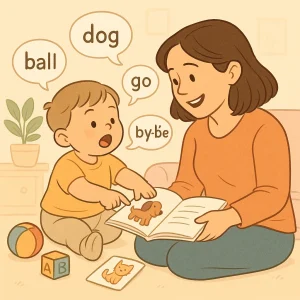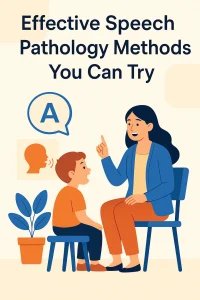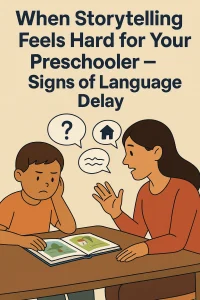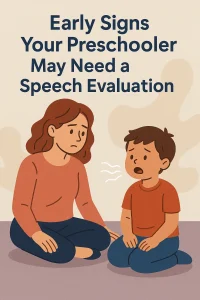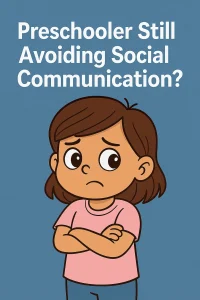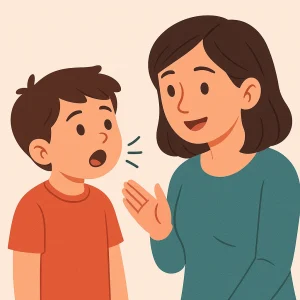Understanding Apraxia of Speech – Types, Symptoms and Support
By Rajini D
Last Updated: April 15, 2024
Apraxia of speech can be a puzzling and often frustrating experience. Have you ever found yourself or a loved one struggling to articulate thoughts into words despite knowing exactly what you want to say? This neurological condition affects a person’s ability to plan and coordinate the muscle movements needed for speech. It’s not simply finding the right words; the brain has difficulty sending the necessary signals to the muscles. Apraxia of speech can be a whirlwind of emotions, not just for those experiencing it but for their families and friends, who might feel equally confused and concerned.
Understanding Apraxia
What is Apraxia
Imagine the brain as the command center for all our actions, including speaking. Now, picture a situation where the command center is unable to send the right instructions to say what you want to, even though you know exactly what you want to say. This is apraxia in a nutshell—a neurological condition where there’s a disconnect between thought and action. You have the words right there on the tip of your tongue, but the pathway to articulate these words is somehow blocked or disrupted.
Types of Apraxia
While there are several types of apraxia, our focus here is on apraxia of speech, which directly impacts one’s ability to communicate. However, it’s helpful to know that apraxia can affect more than just speech. Some people might experience challenges with motor tasks, like dressing or writing, known as limb-kinetic apraxia. Others might find it difficult to perform facial movements, such as smiling or blinking, known as orofacial or buccofacial apraxia.
The aplasia of speech stands out, particularly because speech is crucial for interaction. It can be present from childhood—termed Childhood Apraxia of Speech (CAS)—or acquired later in life due to brain injury, stroke, or other medical conditions, which is known as Acquired Apraxia of Speech.
Symptoms of Apraxia of Speech
- Difficulty combining sounds into words
- Inconsistent errors in speaking (saying the same word differently each time)
- Groping movements of the mouth and tongue when trying to speak
- Limited babbling in infants
- Pauses between sounds and syllables
- Monotone or stressed speech
If you think you or someone you know may have apraxia of speech, it’s important to see a speech-language pathologist (SLP) for a diagnosis and treatment plan.
Is Apraxia of Speech the Same as Aphasia or Dysarthria?
Apraxia often gets confused with other communication disorders like dysarthria and aphasia. Here’s a quick way to tell them apart:
- Apraxia is about difficulty with motor planning when speaking. The desire and knowledge of how to speak are there, but the execution falters.
- Dysarthria occurs when the muscles you use to speak are weak, slow, or you can’t control them. It’s not a planning issue but a physical one.
- Aphasia involves problems with language itself. Understanding and producing language is impaired; it’s not just about moving muscles to form words but about grasping language at a fundamental level.
Know more about our article on Decoding the Differences: Aphasia and Apraxia Unveiled.
Recognizing Apraxia
Recognizing the signs of apraxia, especially apraxia of speech, can be the first step toward getting the support and interventions necessary to improve communication abilities. Understanding these signs is crucial, not just for the individuals who may be experiencing them but also for their families, educators, and caregivers. Here, we’ll outline some common signs of apraxia of speech, offering relatable examples to help identify potential concerns without delving into medical jargon.
Signs and Symptoms
Imagine watching a movie with the audio slightly out of sync. The actors’ movements don’t quite match the words, creating a sense of disconnection. Similarly, individuals with apraxia know what they want to say but find a disconnect between their thoughts and their ability to express them verbally. Here are some signs that might indicate apraxia of speech:
- Difficulty Combining Sounds: Sounds may be produced accurately in isolation but become jumbled when attempting to combine them into words or sentences.
- Inconsistent Errors: The person might say the same word differently each time, illustrating the struggle to plan and execute speech movements.
- Groping Movements: You might notice visible struggling or groping movements as they attempt to form words, indicative of the effort to coordinate mouth and tongue movements.
- Limited Babbling in Infants: For childhood apraxia, babies may babble less than expected, and the first words may be delayed.
- Pauses Between Sounds and Syllables: Unlike the fluid motion of speech, someone with apraxia might have notable pauses as they manually piece together sounds and syllables.
- Altered Tone and Stress: Speech may sound monotonous or place unusual emphasis on certain syllables, affecting the natural rhythm of speech.
When to Seek Help
If you or someone you know exhibits these signs, it’s essential to consult with a speech-language pathologist (SLP) for an accurate diagnosis. An SLP can perform specialized assessments to distinguish apraxia from other speech disorders, ensuring that any intervention is tailored to the specific needs of the individual.
Causes and Diagnosis
When facing a condition as complex as apraxia, understanding its roots and how it’s identified can be incredibly empowering. Let’s unpack this in a way that’s easy to digest, focusing on apraxia’s causes and how professionals diagnose it.
Understanding the Causes
Think of a tree, each root feeding it for different reasons. Now imagine these roots are like the causes of apraxia, each one affecting the tree in its own way.
- Genetic Causes: Sometimes, apraxia is like a family trait handed down through generations. Scientists are looking into specific genes that might play a role, especially when apraxia shows up right from birth.
- Developmental Causes: When we talk about Childhood Apraxia of Speech (CAS), it’s a bit like trying to solve a puzzle without all the pieces. The brain struggles to plan and make speech happen.
- Acquired Causes: This is when something happens, like a stroke or a hit on the head, that changes how well someone can speak. It’s as if a storm has hit part of the tree, messing up its growth and how it works.
Treatment for Apraxia of Speech
Getting to a diagnosis of apraxia involves a journey with several steps, often starting with a feeling that something isn’t quite right with how a loved one speaks or moves. Here’s where the expertise of a speech-language pathologist (SLP) becomes invaluable.
Sarah, a concerned parent who notices her son, Alex, struggles more than other children his age to form clear words. Sarah schedules a free consultation with an SLP, beginning Alex’s journey toward diagnosis.
- Initial Consultation: The SLP listens to Sarah’s observations, gathers a comprehensive history, and watches Alex play. It’s a bit like detective work, where every clue contributes to a bigger picture.
- Assessment: Using a variety of tools and tests, the SLP assesses Alex’s speech. They might ask him to repeat sounds, words, and sentences, observing and noting where the breakdowns occur. This process is thorough, ensuring they capture the full scope of Alex’s speech capabilities.
- Analysis and Diagnosis: With the information gathered, the SLP compares Alex’s abilities to typical developmental milestones. If the patterns align more with apraxia than other speech disorders, the SLP will prepare a diagnosis and discuss it with Sarah, providing clarity and a path forward.
- Creating a Plan: Diagnosis in hand, the journey continues as they chart a course for therapy tailored to Alex’s unique needs. It’s about building a roadmap to help Alex navigate his way to clearer speech.
Also read: Understanding Speech Delay: Causes, Milestones, and Therapy
Navigating Treatment and Care
Discovering the most effective ways to manage and treat apraxia can significantly enhance the quality of life, not just for those directly affected by this condition but also for their families and caregivers. Here, we will explore the various treatment approaches, offer support strategies for loved ones, and share tips for adapting to life with apraxia, all while keeping the tone approachable and the content highly relevant.
Approaches to Treatment
Treatment for apraxia is as unique as the individuals it affects, often involving a team of professionals and a combination of methods:
- Speech Therapy: Speech therapy is the core of managing apraxia, especially speech apraxia. Speech-language pathologists (SLPs) use techniques tailored to each person’s needs, focusing on improving the planning, sequencing, and coordination of muscle movements for speech. Therapy might include practicing sounds, words, and sentences, often starting slow and building in complexity.
- Physical Therapy: Physical therapy can help with apraxia that affects movement beyond speech. It’s about strengthening the connection between thought and physical action and improving motor skills through repetitive exercises and tasks.
- Alternative Communication Methods: Sometimes, it’s beneficial to incorporate tools like sign language, picture boards, or speech-generating devices, especially for those who find verbal communication particularly challenging. These methods provide a valuable bridge to effective communication, ensuring individuals can express themselves and connect with others.
Treatment Approaches for Apraxia
| Treatment Type | Description | Goals |
|---|---|---|
| Speech Therapy | Focused on improving the planning, sequencing, and articulation of speech through exercises and strategies tailored to individual needs. | – Improve speech clarity – Enhance communication effectiveness |
| Physical Therapy | Aims to improve gross and fine motor skills through physical exercises, often used for types of apraxia that affect body movements beyond speech. | – Enhance motor skills – Improve coordination |
| Alternative Communication Methods | Utilizes tools and technologies such as picture boards, speech-generating devices, or sign language to facilitate communication for those with severe speech difficulties. | – Facilitate effective communication – Increase independence in expressing needs |
Supporting a Loved One with Apraxia
Support from family and friends is invaluable. Here are a few ways to offer your support:
- Educate Yourself: Understanding apraxia’s challenges helps you provide the right kind of support and empathy.
- Be Patient and Encouraging: Celebrate small victories and be patient with the slow progress. Encouragement can be a powerful motivator.
- Establish a Supportive Environment: Create a communication-friendly environment that reduces pressure and frustration for your loved one.
Wellness Hub is here as your partner, offering access to specialists and support groups that can help navigate the complexities of apraxia together.
Living with Apraxia
Living with apraxia is a journey that requires adaptation, resilience, and support:
- Embrace Community: Connecting with others facing similar challenges can provide comfort, practical advice, and a sense of belonging. Consider joining forums or local groups dedicated to apraxia.
- Utilize Technology and Tools: Explore apps and devices designed to aid communication and daily tasks. They can be life-changing in promoting independence and confidence.
- Advocate for Accommodations: In school or the workplace, advocate for necessary accommodations to effectively support your or your loved one’s needs.
Remember, apraxia doesn’t define you or your loved one. With the right approaches to treatment, a strong support system, and a community that understands, it’s possible to navigate the challenges of apraxia successfully.
Support Resources for Apraxia
| Resource Type | Description | Access Through Wellness Hub |
|---|---|---|
| Support Groups | Forums and groups that provide emotional support, shared experiences, and practical advice for individuals and families dealing with apraxia. | Yes |
| Educational Materials | Comprehensive guides, articles, videos, and infographics designed to explain apraxia, its symptoms, treatment options, and coping strategies. | Yes |
| Professional Help | Access to a network of specialists such as speech-language pathologists, occupational therapists, and physical therapists who can provide personalized care plans. | Yes |
Wellness Hub and Apraxia
Navigating the journey of apraxia, with its challenges and triumphs, requires a reliable compass. This is where Wellness Hub steps in—not just as a guide but as a companion on your journey towards better understanding, managing, and living with apraxia.
How Wellness Hub Can Help
At Wellness Hub, we understand the importance of having the right support at the right time. That’s why we’ve cultivated a comprehensive platform that serves as a beacon for those affected by apraxia and other communication disorders. Here’s how we can help:
- Access to Specialists: Finding a specialist who understands the intricacies of apraxia can be daunting. Wellness Hub simplifies this process, offering a directory of experienced speech-language pathologists (SLPs) and other professionals specializing in apraxia. Each specialist is vetted to ensure they bring expertise, empathy, and understanding to their practice.
- Educational Resources: Knowledge is power, and Wellness Hub is committed to empowering you. Our library of resources includes articles, videos, and infographics designed to demystify apraxia. From understanding the basics to diving into advanced topics, these resources are crafted to be accessible and informative.
- Supportive Community: Perhaps one of the most significant aspects of navigating a condition like apraxia is knowing you’re not alone. Wellness Hub hosts forums and support groups that connect you with others who understand what you’re going through. Share experiences, tips, and encouragement in a safe and supportive environment.
Conclusion
As we wrap up our exploration of apraxia, let’s keep one thing in mind: hope and help are always within reach. Understanding apraxia opens the door to effective treatments and strategies that make a real difference. It’s a journey, sure, but one filled with support at every turn. From speech therapy, which unlocks new ways to communicate to communities like Wellness Hub and offers a listening ear and a helping hand, no one has to walk this path alone.
We’d love to hear from you. Sharing your stories or questions about apraxia can shine a light on others and remind us that we’re in this together. Your experiences can offer hope, provide insights, and foster a welcoming space where everyone’s journey is valued. Let’s keep the conversation going and continue to support each other every step of the way.
Frequently Asked Questions:
1. What is apraxia of speech?
Apraxia of speech is a motor speech disorder that makes it hard for someone to move their mouth and speak. This happens even though their muscles are fine. It’s like the brain can’t tell the mouth how to move to make words.
2. How can you tell if someone has apraxia?
Some signs of apraxia include trouble putting sounds and syllables together in the correct order, inconsistent errors when speaking, and a struggle to say long or complex words. If you notice these signs, it might be time to see a specialist.
3. Can apraxia happen in adults?
Yes, adults can have apraxia, too, often due to a stroke or brain injury. This is known as acquired apraxia of speech. For example, in children, it affects the ability to form words correctly, even though the person knows what they want to say.
4. What treatments are available for apraxia?
Treatment usually involves speech therapy, which helps improve the ability to form sounds and words. Physical therapy and alternative communication methods might also help, especially if apraxia affects more than just speech.
5. How does Wellness Hub support those with apraxia?
Wellness Hub offers access to specialists, educational resources, and a supportive community. It’s a place where individuals with apraxia, their families, and caregivers can find professional help, learn more about the condition, and connect with others facing similar challenges.
6. Is there a cure for apraxia of speech?
While there’s no cure, consistent speech therapy can greatly improve speech abilities. The key is early diagnosis and tailored treatment plans that address each individual’s needs.
7. How can I support a loved one with apraxia?
Educating yourself about apraxia, being patient, and encouraging them through their treatment can be incredibly supportive. Joining support groups and connecting with others in the apraxia community can also offer valuable insights and encouragement.
8. Where can I find more information about apraxia?
For comprehensive information about apraxia, visiting reputable health websites and resources like Wellness Hub can provide you with a wealth of knowledge and support options tailored to those experiencing apraxia and their families.
9. What role do speech-language pathologists play in treating apraxia?
Speech-language pathologists (SLPs) are crucial in diagnosing and treating apraxia of speech. They create personalized therapy plans to help individuals improve their speech abilities. Through various exercises, they work on making it easier for patients to plan, sequence, and articulate sounds, words, and sentences. SLPs also provide valuable strategies for effective communication and can recommend alternative communication methods if necessary.
10. Can technology help people with apraxia communicate more effectively?
Yes, technology can play a significant role in aiding communication for those with apraxia. Speech-generating devices, apps that focus on speech therapy, and other assistive technologies can offer alternative ways to communicate. These tools can complement traditional speech therapy, providing practical support in daily life and helping individuals with apraxia express themselves more clearly and confidently.
About the Author:
Rajini Darugupally
M.Sc., Speech-Language Pathologist (9+ years of experience)
Rajini is a passionate and dedicated Speech-Language Pathologist with over 9+ years of experience, specializing in both developmental speech and language disorders in children and rehabilitation in adults. Driven by a desire to empower each individual to find their voice, Rajini brings a wealth of experience and a warm, genuine approach to therapy.
Currently, at Wellness Hub, she thrives in a team environment that values innovation, compassion, and achieving results for their clients.
Connect with Rajini to learn more about how she can help you or your loved one find their voice.
Book your Free Consultation Today
Parent/Caregiver Info:
Client’s Details:
* Error Message


